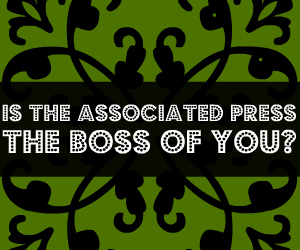Is the AP Stylebook YOUR Bible?
 The Associated Press Stylebook is what the AP calls “the journalist’s bible” and for anyone who has ever been involved in the journalism world probably owns a copy from at least one year (although journalism students now use the online version) and determines exactly how an article should be formatted. Some bloggers adhere to the stylebook while others threw it out the window and even more have no idea it exists. Once upon a time, it was a great idea to have consistency in reporting formatting, but blogging has ignored most of the traditional media rules anyhow, so should bloggers worry about following the AP format? Some vehemently say yes (just google it).
The Associated Press Stylebook is what the AP calls “the journalist’s bible” and for anyone who has ever been involved in the journalism world probably owns a copy from at least one year (although journalism students now use the online version) and determines exactly how an article should be formatted. Some bloggers adhere to the stylebook while others threw it out the window and even more have no idea it exists. Once upon a time, it was a great idea to have consistency in reporting formatting, but blogging has ignored most of the traditional media rules anyhow, so should bloggers worry about following the AP format? Some vehemently say yes (just google it).
I have a copy somewhere of the AP Stylebook from when I was a budding high school journalist (newspaper staffers, UIL journalism, UIL creative writing and yearbook editors in the house, heey!) and have referred to it many times when writing to clarify issues such as one that still eludes me, “affect vs. effect.” Rules include spelling out all numbers with values under ten unless they’re a person’s age, spelling out the word “percent,” not typing “US” rather “U.S.” and never using titles like “Mrs.” or “Mr.” rather sticking to a person’s name. We do follow some of the more common sense AP style rules and others we don’t because blogging is written in a more stream-of-consciousness format without a series of editors that have to make the marketing department happy with AP perfection.
The implication is that journalists should follow the AP Stylebook and many bloggers consider themselves journalists, but I would argue that a citizen journalist is far different from a traditional journalist not just because of accountability but because the goal post never moves and there is a code of ethics in the industry (whereas bloggers CAN say what they want when they want without the same implications).
That said, the Associated Press doesn’t play well with others and sues anyone who uses any of their news stories, even if quoting and giving link attribution to a single quote or line, so why would bloggers even pay AP any mind? Once upon a time, I thought the AP was a wonderful, incredible, well-oiled machine that offered unification in journalism, but now they are a walled garden of pay to play, ivory tower mentality. Tech Crunch shares my sentiment that the AP is a massive bully and in 2008 banned any AP story, instructing their writers and audience to act as if the AP doesn’t even exist.
Knowing that the AP is a bully with their content, why would we bow down to a guideline they’ve set out and deemed “the way” to write all content be it online or in print? It’s traditional, it had its place once upon a time, it’s always been a great reference for writing, but for web content produced by non-journalists, it’s not a “bible,” it’s obsolete in my opinion.
As a sidenote, I anticipate angry letters from the Associated Press as well as AP groupies, so leave AgentGenius.com be, my direct email is agentgeniuslani at gmail dot com. Have at it.
Lani is the COO and News Director at The American Genius, has co-authored a book, co-founded BASHH, Austin Digital Jobs, Remote Digital Jobs, and is a seasoned business writer and editorialist with a penchant for the irreverent.











































Matthew Rathbun
December 3, 2009 at 5:41 am
Lani,
I was listening to a presentation given at the Library of Congress in 2005. I don’t recall the speaker’s name but he made the point that Blogs by their very nature are written badly. Most do not put the time and effort into a blog post that they would a book or extensive news article.
He want on to say that the persona of a blog would diminish if it was as polished as some news articles, because people will trust bloggers “like me” more so than main-stream-media. I think most of us would agree that we’d prefer the open bias of a bloggers over veiled bias of a news source.
Lani Rosales
December 3, 2009 at 10:31 am
Great point, @mattrathbun- I like a healthy mix of both which is why I still watch hours of news every day as well as read hundreds of blog articles. I think the AP Style is great for print journalism but bloggers don’t have a staff of trained editors, researchers, fact checkers, sales departments, etc. The AP is a bully and not friendly to bloggers so why should bloggers be friendly to their way of thinking?